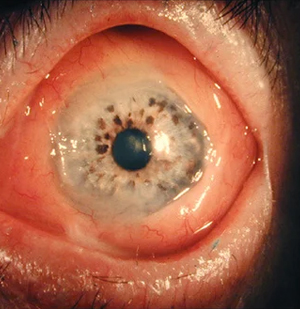
Ocular Oncology
Ocular Oncology is a subspecialty of ophthalmology focused on the diagnosis and treatment of eye tumors, both benign and malignant, that may affect the eyelid, conjunctiva, retina, choroid, or orbit. These tumors can threaten not only vision but, in some cases, life itself if untreated.
At Vision 2020 Complete Eye Care, Dr. Uday Tekchandani offers comprehensive care for ocular tumors, with advanced diagnostic tools and minimally invasive treatment options designed to preserve sight and ensure the patient’s overall well-being.
Symptoms That May Indicate an Eye Tumor
While some eye tumors may remain asymptomatic in the early stages, possible warning signs include:
- Sudden or unexplained decrease in vision
- Appearance of dark spots or masses in the eye
- White reflex in the pupil (leukocoria) — especially in children
- Eye redness, pain, or bulging of the eyeball (proptosis)
- Change in shape or size of the iris or pupil
Common Causes and Types of Ocular Tumors
Ocular tumors can arise from various parts of the eye or its surrounding structures. The main causes and types include:
- Retinoblastoma: A childhood cancer arising from retinal cells, usually diagnosed in infants and young children.
- Choroidal Melanoma: The most common primary intraocular tumor in adults, originating from pigment cells in the choroid.
- Metastatic Tumors: Spread from cancers elsewhere in the body (such as breast or lung) to the eye.
- Conjunctival Tumors: Growths on the surface membrane of the eye, ranging from benign to malignant.
- Orbital Tumors: Tumors located behind or around the eye causing protrusion or restricted eye movement.
Treatment Options
Management of ocular tumors is highly individualized and depends on the type, size, and location of the tumor, as well as patient age and vision potential. Dr. Tekchandani provides a full spectrum of modern treatments including:
- Laser Photocoagulation: Targeted laser therapy to destroy tumor blood supply and prevent growth.
- Cryotherapy: Freezing therapy to treat small surface tumors or retinoblastoma spots.
- Intravitreal Chemotherapy: Direct injection of chemotherapy into the eye to treat localized retinoblastoma — performed under sterile, No Stitch, No Patch, No Injection (external) conditions.
- Systemic or Intra-Arterial Chemotherapy: For advanced cases requiring targeted drug delivery through major blood vessels.
- Vitrectomy and Tumor Excision: Performed with micro-incision techniques for diagnostic biopsy or removal of intraocular masses.
- Enucleation with Implant Placement: Performed in advanced or life-threatening cases where vision cannot be preserved, ensuring cosmetic rehabilitation with orbital implants.
Key Advantage: All procedures are carried out with advanced micro-surgical systems ensuring maximum precision, comfort, and safety for both adults and children.
Early Detection & Prevention
Regular eye examinations and awareness play a crucial role in identifying ocular tumors early, especially in children. Here are a few preventive steps:
- Ensure timely eye screening for newborns and premature babies.
- Seek evaluation for any white reflex in a child’s eye or abnormal eye movements.
- Adults with pigmented lesions or floaters should undergo retinal evaluation regularly.
- Genetic counseling and family screening may be recommended for hereditary ocular tumors like retinoblastoma.
Why Choose Dr. Uday Tekchandani for Ocular Oncology
- Expertise in managing Retinoblastoma and Choroidal Tumors with advanced vitreoretinal and oncologic techniques.
- Comprehensive diagnostic and therapeutic care with modern imaging and laser technologies.
- Collaborative approach with oncologists, pediatricians, and pathologists for multidisciplinary care.
- Use of micro-incision No Stitch, No Patch procedures ensuring maximum comfort and safety.
- Dedicated patient counselling, genetic evaluation, and long-term follow-up support for recurrence monitoring.
